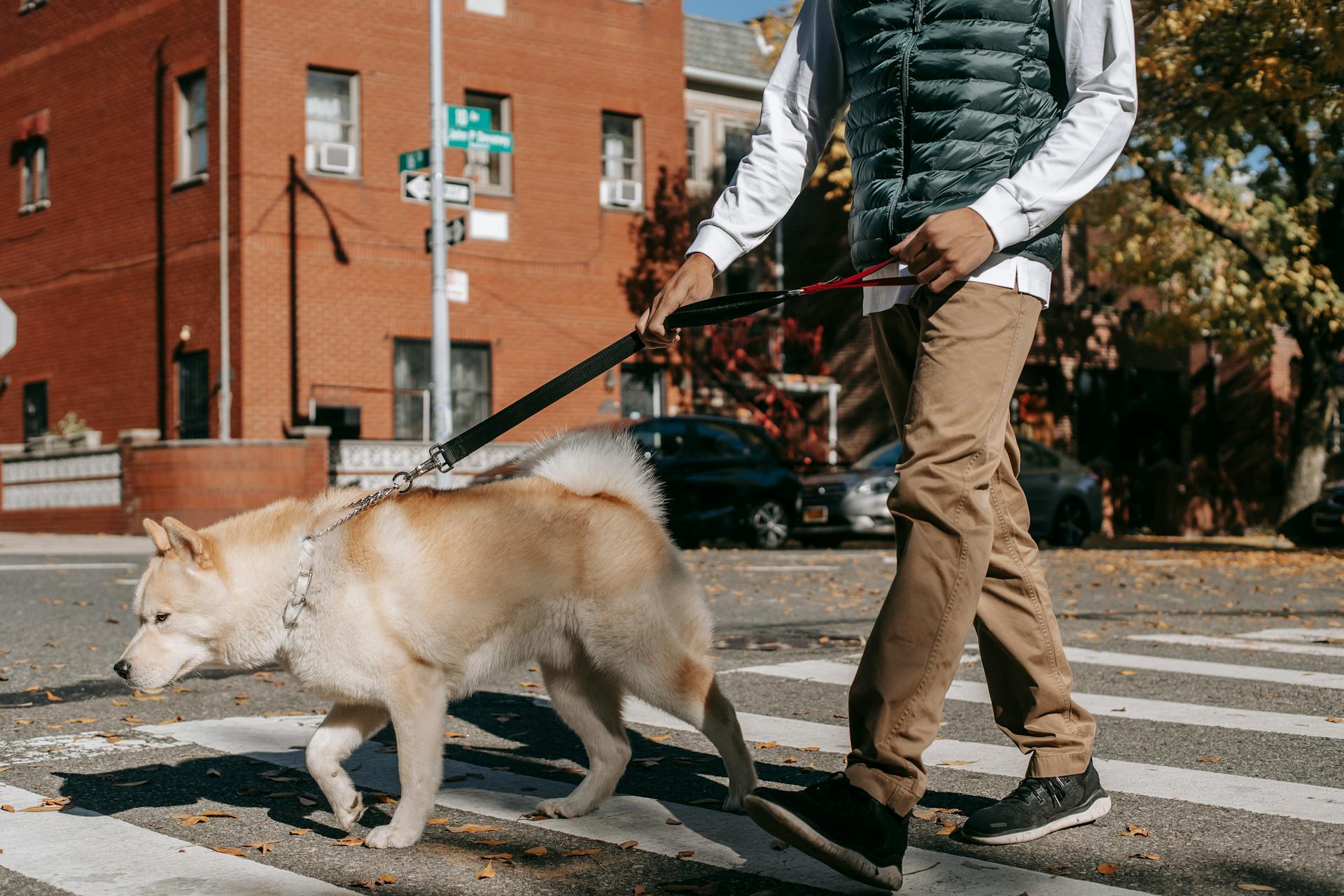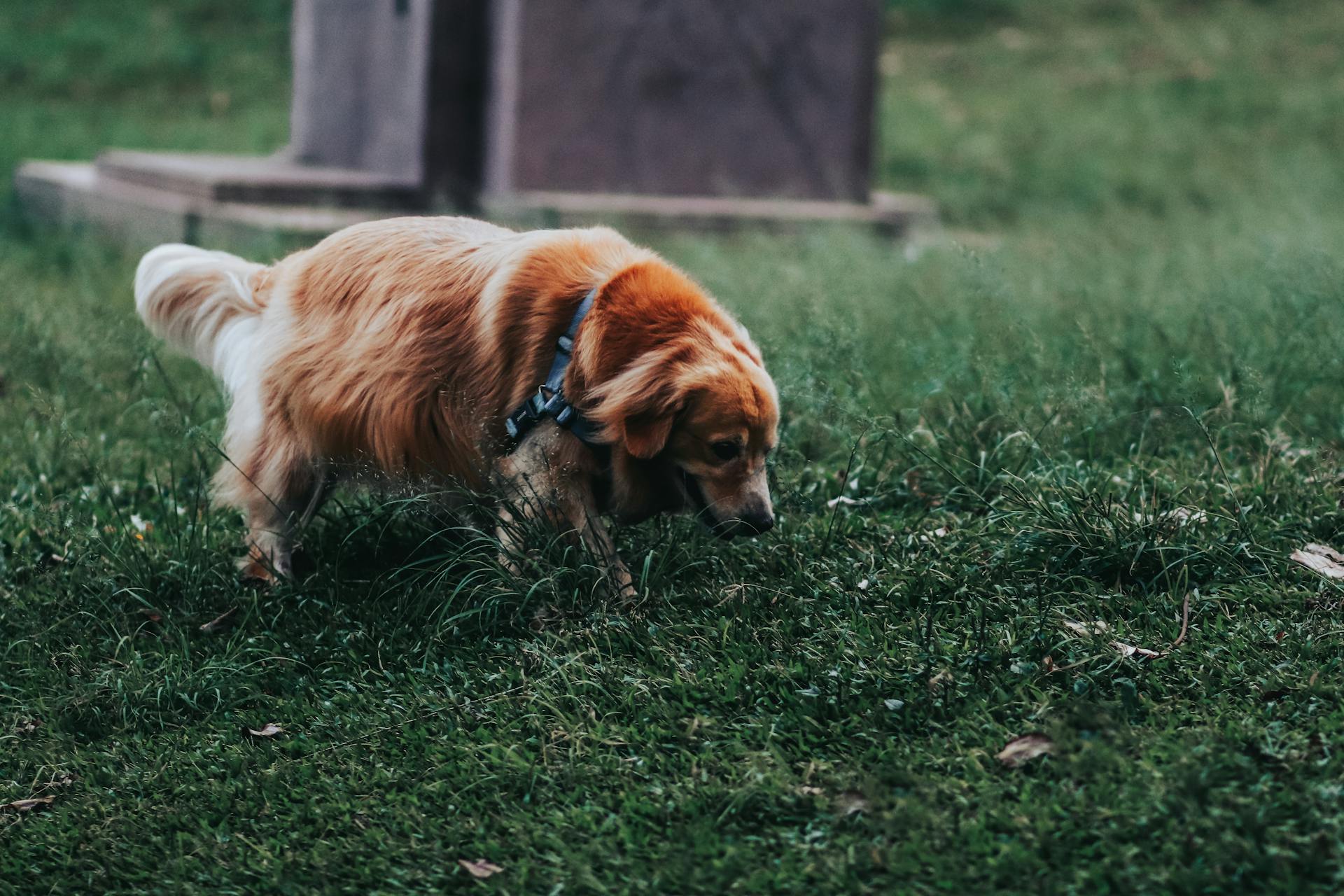
Unneutered male dogs are prone to roaming in search of a mate, which can lead to them getting into fights with other dogs or even getting lost. This behavior is often referred to as "humping" or "mounting" and is a natural instinct for them.
Their strong sense of smell helps them detect female dogs in heat, and they can travel long distances to find one. This can be a concern for pet owners who live in areas with a high population of stray dogs.
As they mature, unneutered male dogs may develop dominant behaviors, such as marking territories with urine, mounting other animals, or even people. This can be a challenging behavior to address, especially if it's a result of their natural instincts.
Their high energy levels and strong prey drive can also lead to destructive behavior, such as digging or chewing, if they're not provided with adequate exercise and mental stimulation.
For another approach, see: How to Stop a Male Dog from Mounting Other Dogs
Reasons for Neutering
Neutering is a permanent procedure that prevents unwanted behaviors and health issues in unneutered male dogs.
Male dogs can display aggressive behavior, territorial marking, and roaming in search of a mate, making neutering a must for canine owners who won't be professional breeders.
Unneutered male dogs can sire multiple litters from different female dogs if allowed, making neutering paramount to population control.
Neutering reduces the likelihood of your dog running away from home or wandering off, as unneutered male dogs are more likely to roam in search of a mate.
Neutering is a surgical procedure that should be done by a licensed veterinarian, as there can be risks associated with any surgical procedure.
Male dogs can be on the mating clock at any time, not just during a female's heat cycle, making neutering a crucial decision for responsible dog ownership.
For more insights, see: Dog Boarding That Doesn't Require Neutering near Me
Behavioral Changes
Unneutered male dogs may exhibit aggressive behavior, especially towards other male dogs, due to their dominant instincts to secure mating rights in the wild.
Increased territorial behavior can also be a sign that it's time to neuter, as male dogs become more protective of their space and may see other dogs as a threat.
Social behavior differences between neutered and intact male dogs have been observed in studies, with neutered dogs appearing less confident and more anxious in group interactions.
Neutered dogs may be more likely to exhibit fearful behavior and aggression towards other dogs, according to owner assessments.
Unneutered male dogs may display over-excited behaviors due to hormonal fluctuations, making them appear more restless than usual.
Male dogs that are not neutered might frequently mount other pets, objects, or even people as a display of dominance, which can be reduced through neutering.
Unneutered male dogs are more likely to roam away from home and wander off, especially when they're affected by a female in heat.
Unneutered males are generally more dominant and territorial, and may see other dogs as a threat and challenge for resources, potentially leading to fights.
Neutering can help reduce unwanted behaviors such as humping people's legs or humping other dogs, including neutered male dogs.
Here's an interesting read: Dogs Humping Other Animals
Benefits and Improvements
Neutering your dog can have a significant impact on their behavior.
Unneutered male dogs are more likely to exhibit aggressive behavior, such as biting and fighting with other dogs.
Neutering can help reduce this behavior and make your dog more pleasant to be around.
Male dogs displaying signs they want to mate, such as aggressive behavior, territorial marking, and roaming, indicate it's time to neuter.
Neutering is a permanent procedure, and once it's done, the dog will no longer be able to reproduce.
Having the procedure done by a licensed veterinarian is crucial, as there can be risks associated with any surgical procedure.
Health and Safety
Unneutered male dogs are more likely to roam in search of a mate, which can put them in danger of getting hit by a car or getting lost and poisoned.
Neutering can help prevent unwanted behaviors and health issues in dogs. It involves removing the testicles of a male dog, which can be done to prevent roaming.
Unneutered male dogs may engage in unwanted behaviors such as roaming, which can lead to them getting lost and injured.
Readers also liked: Unneutered Dog Daycare
Understanding Dog Behavior
Dogs that haven't been neutered may exhibit more confident behavior than those that have been neutered.
Neutered male dogs may be less confident and more anxious than intact male dogs, as observed in a study that analyzed video footage of dogs interacting with each other.
In fact, the study found that neutered dogs were less likely to engage in behaviors like sniffing another dog's perianal region, which is a common way for dogs to greet each other.
Owner surveys also showed that intact dogs were rated as being bolder and more sociable to other dogs than neutered dogs.
However, some owners reported that neutered dogs were more trainable than intact dogs, according to the same surveys.
It's worth noting that the study's authors caution against neutering male dogs solely to change unwanted behavior, as the procedure may not produce the desired effect.
In fact, more owners of neutered dogs than intact dogs sought behavioral consultation, indicating that neutered dogs may be more prone to fearful behavior and aggression towards other dogs.
Overall, the study suggests that intact male dogs may have a more confident and bold personality than neutered male dogs.
Here's an interesting read: Intact Male Dogs
Training and Considerations
Training unneutered male dogs can be affected by their reproductive status. Entire dogs are significantly more trainable than neutered dogs, according to Fattah and Abdel-Hamid (2020).
Neutering before 7 months of age can actually decrease trainability, as it's associated with increased hyperactivity, reactivity, and prey drive. Delayed neutering, on the other hand, between 7 and 11 months of age, can increase trainability and focus.
It's essential to consider individual factors, such as clinical and behavioural history, before making a decision about neutering. Clinicians should discuss potential benefits and contraindications with owners, and trial temporary medical contraceptives in dogs with behavioural issues, like fearfulness.
General Training
General training can be affected by a dog's reproductive status. Entire dogs are significantly more trainable than neutered dogs.
Some breeds, however, may not follow this trend. Castrated male Shetland Sheepdogs, for instance, appeared more trainable in one study.
Delaying neutering until between 7 and 11 months of age can increase trainability and focus, and reduce hyperactivity, reactivity, and prey drive compared to earlier neutering.
Clinical Practice Considerations

Before making any decisions about your furry friend's training, it's essential to consider their individual needs and circumstances.
Clinicians should consider a dog's clinical and behavioural history before opting for any procedures.
Discussing potential benefits and contraindications with the owner is crucial in making an informed decision.
Temporary medical contraceptives may be a good option for dogs with behavioural issues, such as fearfulness.
Trialing these contraceptives can help evaluate the effect of reducing testosterone and oestrogen on a dog's overall behaviour.
This approach may be more prudent than opting for permanent removal of reproductive hormones.
Suggestion: Why Does My Male Dog Lick My Female Dogs Pee
Sources
- https://www.pets4homes.co.uk/pet-advice/how-the-behaviour-of-an-un-neutered-male-dog-differs-from-that-of-a-neutered-dog.html
- https://pawsafe.com/blogs/dog-healthcare/8-signs-your-dog-needs-to-be-neutered
- https://www.petfinder.com/dogs-and-puppies/behavior/other-problem-behaviors/unneutered-dogs/
- https://www.veterinary-practice.com/article/effects-of-neutering-on-undesirable-behaviours-in-dogs
- https://www.dvm360.com/view/social-behavior-differences-in-neutered-and-intact-male-dogs
Featured Images: pexels.com


